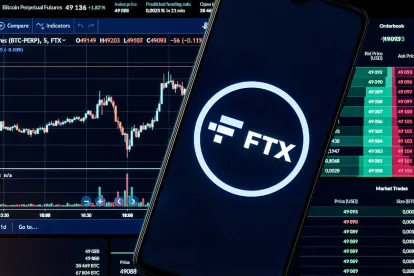On November 11, 2022 FTX Trading Ltd. (“FTX”) and its affiliated debtors (together, the “FTX Debtors”) filed emergency Chapter 11 bankruptcy cases in Delaware. The filing came less than two weeks after documents were leaked showing that Alameda Research, a cryptocurrency hedge fund affiliated with FTX, secretly held a large amount of FTT (FTX’s own cryptocurrency token), sparking viral liquidity concerns about Alameda, and a Bahamian financial regulator froze the assets of FTX and appointed a provisional liquidator.
Four months later, on March 15, 2023 the FTX Debtors filed their schedules of assets and liabilities. In the weeks that followed, the FTX Debtors sent emails to potentially one million customers or more worldwide (one FTX Debtor, West Realm Shires Services Inc. (“WRSS”), listed over 400,000 customers as unsecured creditors who presumably all received an email) informing them that:
“You are receiving this email because you have been identified as a customer with a net positive account balance as of November 11, 2022 of one or more of the debtors in the Chapter 11 cases of FTX Trading Ltd. and certain of its affiliated debtors and debtors-in-possession pending in the United States Bankruptcy Court for the District of Delaware and jointly administered under the case number 22-11068. You have been listed in one or more of the debtors’ schedules and statements.”
Recipients of these notices undoubtedly have many questions, possibly including: what does having a “net positive account balance” mean? Does this mean that these customers are one step closer to getting their cryptocurrency back from FTX, as many may think when they receive these notices? What further action is required, e.g., will they have to file a proof of claim down the road?
“Net Positive Account Balance”
The amount of the “Net Positive Account Balance” that customers might get back depends heavily on whether the cryptocurrency in the accounts belongs to the customer or FTX. If it belongs to the customer, FTX would be holding their property as a custodian and the customer would be entitled to its full return (assuming it is still there) before any creditors of the estate are paid. If it belongs to FTX, the customer would be reduced to a general unsecured creditor, and would only be entitled to a pro rata payment from whatever pool of net assets are available after payment to higher priority creditors. While FTX customers may have thought of their cryptocurrency deposits at FTX as “their cryptocurrency,” the actual nature of the deposits is an open question at this point. In their schedules, the FTX Debtors take the position that some cryptocurrency they are holding is their property, and some remains the customers’ property:
“The Debtors take the position that, consistent with the applicable terms of use between the Debtors and their account holders, certain cryptocurrency held on the Debtors’ platform is property of the Debtors’ estate pursuant to section 541 of the Bankruptcy Code. Conversely, the Debtors take the position that, consistent with the applicable terms of use, certain other cryptocurrency held on the Debtors’ platform is not property of the Debtors’ estate pursuant to section 541 of the Bankruptcy Code.” (emphasis added)
In the case of WRSS, that FTX Debtor takes the position in its schedules that the cryptocurrency it is holding is property of WRSS, not the customer. This position is consistent with a recent ruling in another cryptocurrency-related case, that of cryptocurrency lender Celsius Network, LLC, applying the terms and conditions of the contracts used by Celsius (“Account Holders granted Celsius ‘all right and title to such Eligible Digital Assets, including ownership rights’”). However, at least one challenge has been filed in the FTX case on behalf of a class of customers seeking, among other things, a declaration that the cryptocurrency held by WRSS belongs to the customers, not WRSS. So, for the many customers of WRSS as well as other FTX Debtors, whether they own the cryptocurrency in their accounts is very much an open question at this point.
If the cryptocurrency in the FTX accounts is deemed to be property of FTX and not the customer, customers that withdrew cryptocurrency or other funds from FTX on or after August 13, 2022 (i.e. within the 90 day period prior to the bankruptcy filing date of November 11) could have yet another wrinkle to deal with regarding their claims. That is because they could be the target of a “preference action” down the road, with their claims subject to “disallowance” to the extent of any “preference liability.” Preference actions are a bankruptcy tool that allows the bankruptcy estate to take back payments shortly before the bankruptcy filing, subject to a variety of affirmative defenses that any preference target will surely raise in their defense. While the FTX Debtors are starting with the low-hanging fruit, i.e a more limited subset of parties that received large contributions or other payments in the future, the preference net could expand to include all “90 day transferees” of assets of the FTX Debtors, including customer cryptocurrency withdrawals, to the extent the cryptocurrency is deemed to be property of FTX.
Requirement to File Proof of Claim
In a Chapter 11 bankruptcy case, if a creditor disagrees with the debtor’s scheduling of its claim, or the claim is designated as contested, unliquidated or disputed, it must file its own proof of claim by a court-established deadline. If the creditor agrees with how its claim is listed, it does not have to file a proof of claim. The court in FTX has not established a claim filing deadline yet. When a deadline is set, scheduled creditors will receive a notice about it. However, if the question of ownership is still an open issue as of the bar date for filing claims, customers may face a dilemma as to whether to file a proof of claim in the first place, out of concern for making an inadvertent admission that their interest in the cryptocurrency is that of a creditor, not an owner. Ultimately, a customer may want to file a proof of claim in an abundance of caution, attaching a reservation of rights in the event that they are deemed to be owners, not creditors.
Possible Outcome For Customers
Unfortunately, like many bankruptcy cases at an early stage, the honest answer to this is, “who knows?” The FTX Debtors have not put forth any plan or timeframe about providing customers with access to their accounts, or any projections about what, if anything, owners or creditors might receive in the form of digital assets or a money equivalent. One good resource for customers who want to stay generally up to date is the Unsecured Creditor Committee’s twitter account.




 />i
/>i
